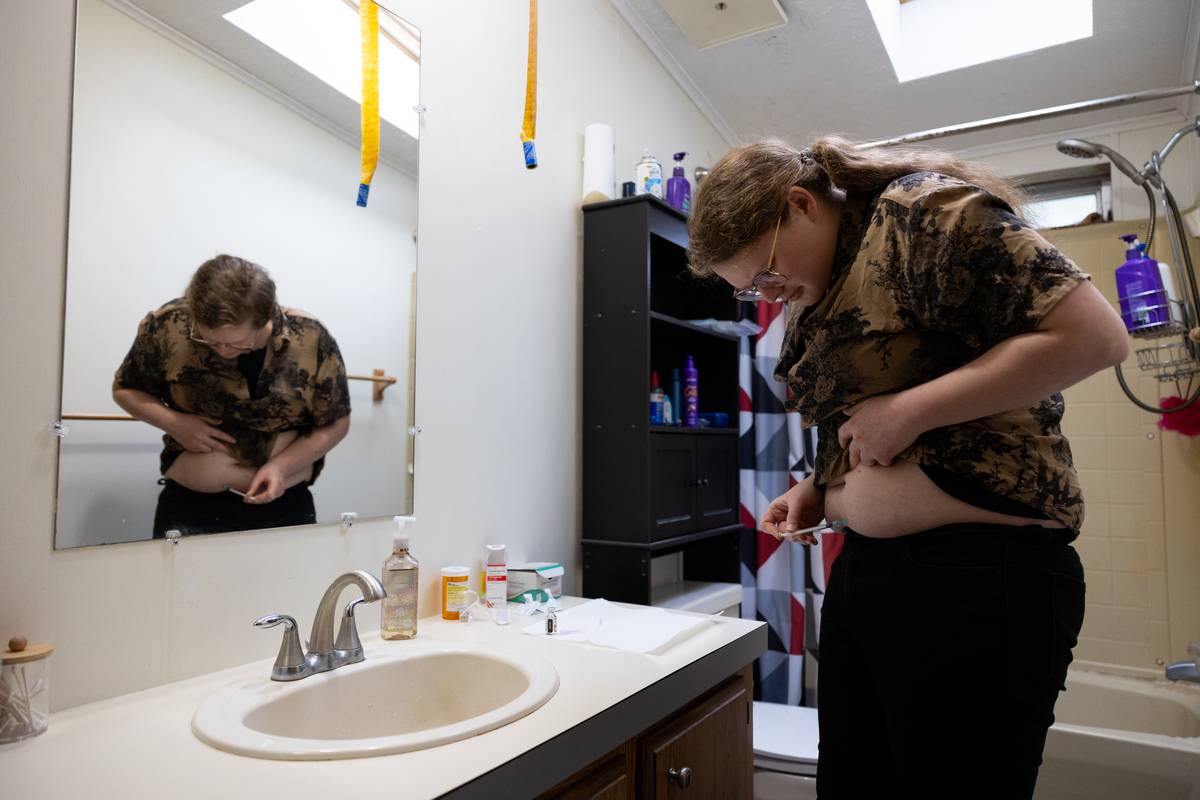

Top: Montgomery at her home in Washington.
Bottm: Zoei Montgomery administers a weekly estradiol injection.
16:26 JST, December 10, 2024
Zoei Montgomery is so nervous about Donald Trump’s second presidency that she is making plans to escape to Canada if life in the United States becomes intolerable for her as a transgender woman.
The middle-school custodian fears that the incoming president will follow the lead of Republican governors who have restricted access to gender-affirming care and made it illegal for people to change their gender markers on official documents.
“I would hate to leave home,” said Montgomery, 25, who lives in Washington state. “But it makes me less anxious to have an exit plan in place.”
As Trump’s inauguration nears, some LGBTQ+ people are anxiously preparing for what they fear will be a rollback of their rights. Some in same-sex relationships are making plans to marry or to adopt children. Others are moving to states that they believe will offer them more protection. Transgender people are stockpiling medications, worried that their access to gender transition care will be cut off.
Trump has vowed to prohibit gender transition care for children and eliminate any federal spending on those treatments for adults. He has also promised to ask Congress to pass a bill stating that there are only two genders and that they are assigned at birth. And the incoming president wants to use Title IX protections to ensure that transgender women can’t play on women’s sports teams.
While some of his promises would be difficult to enact, and many others such as banning access to health care probably would be challenged in court, Trump will have the advantage of Republican control in Congress and could also enact some changes through executive action.
Trump’s transition team hasn’t provided further details on his plans, but a spokeswoman for the incoming administration said his campaign focused on “common sense policies” that Americans want.
“Clearly, the American people agree with President Trump and that’s why they voted for him in a landslide,” spokeswoman Karoline Leavitt said.
A survey conducted by Fox News and the Associated Press found that about 55 percent of voters said support for transgender rights in government and society “has gone too far,” and that 77 percent of this group supported Trump.
The survey also found that 51 percent of voters opposed laws banning gender-affirming medical treatment such as puberty blockers and hormone therapy for transgender youths. Among those who do support the ban, 65 percent supported Trump.
On Wednesday, the Supreme Court’s conservative majority appeared reluctant to block a Tennessee law restricting transgender minors from accessing puberty blockers and hormones as part of their gender-transition care. The ruling will affect thousands of transgender youths who live in one of the 24 states, including Tennessee, that have banned similar treatments.
Trans rights were far from the top issue for many voters this election, said Republican pollster Robert Blizzard, but the topic was an animating force for some. Swing-state voters, he said, were angry with Democrats who they said pushed “trans ideology” onto children.
Blizzard, who did not do polling work for the Trump campaign, said voters were worried about children.
“That’s a big concern for a lot of folks across the country, minors making decisions that will change their lives and bodies long-term.”
Michele Zavos, a D.C.-based attorney specializing in LGBTQ+ family law, said it’s a “very complicated time” for the community.
“Rights that we thought were resolved seem to once again be at risk,” she said.
Even before Trump won the presidency, LGBTQ+ people had endured several tumultuous years. Republican lawmakers in statehouses and the U.S. Capitol have introduced a record number of bills aimed at restricting LGBTQ+ rights under President Joe Biden. Schools in Florida and North Carolina have fired gay teachers. Trans children have lost access to health care they describe as lifesaving. And Republicans spent at least $215 million on election ads that painted trans people as the nation’s most pressing threat.
In the initial weeks after the election, LGBTQ+ people and advocacy groups say some of their worst fears are already coming true. Rep. Nancy Mace (R-South Carolina) introduced a measure to bar trans women from women’s bathrooms in the Capitol and all other federal properties two weeks after Sarah McBride (D-Delaware) was elected the nation’s first transgender member of Congress.
Many of Trump’s Cabinet picks have also endorsed anti-trans policies. Former Hawaii congresswoman Tulsi Gabbard, the president-elect’s pick for director of national intelligence, introduced a bill in 2020 to prohibit trans women from playing on women’s sports teams. Sen. Marco Rubio (R-Florida), Trump’s choice for secretary of state, introduced a bill in 2023 to ban anyone with a history of gender dysphoria from the U.S. military. And South Dakota Gov. Kristi L. Noem (R), selected to head the Department of Homeland Security, signed a ban on gender-affirming health care for trans youths last year.
Montgomery said she has been stockpiling estradiol and spironolactone pills since September. She now has enough to last her a few weeks if federal lawmakers banned her care, she said.
“Many people around me are acting like everything is the same since Nov. 5,” she said. “But nothing will be the same for the LGBTQ+ community once Trump’s in power, and he has promised that.”
‘Building a raft on a tsunami’
When Trump first won office in 2016, the LGBTQ+ community was celebrating several milestone victories. The Supreme Court had granted same-sex couples the right to marry the year before, and not long after, President Barack Obama directed schools across the country to allow transgender students to use bathrooms, locker rooms and other facilities that match their gender identity.
But some of those wins were quickly changed when Trump took office. Within a month of his inauguration, Trump revoked the Obama-era guidelines on transgender students. He also ordered the Pentagon to ban transgender service members from the military.
Later on, under Biden, GOP state lawmakers began targeting a range of things, such as LGBTQ+-friendly books in public schools and gender-affirming care for children. So far, 26 states have banned trans girls and women from playing on sports teams that align with their gender identity.
Then came this year’s presidential campaign. Candidates across the country ran more than 200 anti-trans ads on network TV, according to a Washington Post analysis of data compiled by AdImpact. Trump’s super PACs spent at least $50 million on anti-trans ads, and his campaign made “Kamala is for they/them” a reelection slogan.
“There’s a lot of general fear, panic and hopelessness in the community,” said Janson Wu, a senior director at the Trevor Project, a nonprofit that provides support to LGBTQ+ youths aimed at suicide prevention and crisis intervention. “Many people, especially the younger ones, are wondering if they can continue living under these political attacks.”
While some queer and trans families did flee to more LGBTQ+-friendly states during the Biden years, others couldn’t afford to move, or didn’t want to, even as new laws restricted their rights. Now, nonprofit workers say they are hearing from a record number of people who want to relocate to liberal states with explicit protections for gay and trans people.
Keira Richards and a group of friends have been helping people move to Colorado since last year. Normally, their nonprofit, the Trans Continental Pipeline, works with an average of 15 people a month. In the week after the election, Richards said, 350 people contacted the group to ask for assistance.
“They don’t want to leave,” said Richards, the Trans Continental Pipeline’s executive director. “But they just feel like they don’t have a choice.”
Richards’s group is staffed by five volunteers who operate on a shoestring budget. Most people need between $2,000 and $4,000 to move to Denver. And rents in the Mile High City aren’t cheap: The average apartment rent is nearly $1,700 per month, according to Apartments.com. Some of those contacting Richards say they can afford to pay only $400 a month.
“We’re building a raft on a tsunami,” Richards said. “We’re just trying to be able to meet the need that is suddenly here.”
Jake Nichols, a gay 18-year-old from Jefferson City, Missouri, plans to move to California, where his grandmother lives, when he graduates from high school in May. Nichols said he withdrew his acceptance from a university in Missouri after he noticed how emboldened his classmates have become since Trump’s win.
“They say stuff like ‘You queer people will have to go back in the closet now,’ and ‘Without you parading around, we will make America great again like it used to be,’” he said. “Missouri’s not the place for me right now.”
Nichols said he is worried about an erosion of LGBTQ+ rights, including same-sex marriage, under Trump.
Although Trump did not focus on same-sex marriage during his campaign, many in the LGBTQ+ community are concerned that the high court could eventually rescind that right. They point to the court’s conservative supermajority and Justice Clarence Thomas’s concurring opinion in the case overturning Roe v. Wade, in which he stated that the justices should reconsider their 2015 ruling on same-sex marriages.
Bookstores, bars and ordained ministers across the country have offered to host or perform free weddings for gay couples since Trump was elected to another term. Some, like Harold’s Haunt, an LGBTQ+-friendly bar in Pittsburgh, are planning to put up wedding decorations for couples who “need to get married real quick.”
Other LGBTQ+ couples are worried about their parental rights.
Zavos, the family law attorney, said she has seen an uptick in calls, emails and Facebook messages from same-sex couples who fear that the incoming administration or the Supreme Court could curtail their adoption rights.
Some want to fast-track their adoption plans. Others want to start the lengthy second-parent adoption process, which would secure the parental rights of nonbiological parents. Zavos said LGBTQ+ families want to secure all the protections they can in a landscape where rights are being threatened.
“I had taken a semi-retirement,” Zavos said. “But given the circumstances, I will unretire to help the community through this crisis.”
An exit by kayak

Signs supporting Black Lives Matter and LGBTQ+ rights line a fence in Kitsap County, Washington.
Trump’s win has been especially distressing for many young people. The Trevor Project registered a nearly 700 percent increase in calls, texts and chat messages to its crisis services the day after the election, compared with the weeks prior.
State laws targeting transgender people made trans and nonbinary youths between 25 percent and 27 percent more likely to attempt suicide at least once in the second and third years after being enacted, a recent study published in the Nature Human Behavior journal concluded.
Carolyn Fischer knows firsthand how devastating the election has been for some LGBTQ+ teens. She said her 16-year-old son, who is trans, made a pact with three other young trans people to die by suicide if Trump won. The children met on Discord, an online chat platform popular with video gamers, and Fisher said they had discussed how upset they were by the anti-transgender rhetoric coming from Republicans on social media and television.
A few days before the election, Fisher said her son called the Rainbow Youth Project, a nonprofit that offers crisis counseling to at-risk LGBTQ+ youths, and asked for help. All four of the trans adolescents are now receiving counseling, but at least one is still experiencing suicidal ideation.
Fisher and her husband are Republicans who had planned to vote for Trump. But on Election Day, they cast their ballots for Kamala Harris and decorated their front yard with a Pride flag to show support for LGBTQ+ people in the community.
Fisher and her husband have considered leaving their hometown to give their son a fresh start, but they don’t know where they should go.
“Nowhere in the country seems safe for LGBTQ+ kids right now,” she said.
Montgomery, the school custodian from Washington state, is so fearful about life during a second Trump administration that she is preparing an exit plan that includes a kayak.
Her first choice is to remain in Kitsap County, but if her access to gender transition care is limited, she said, she’ll take a ferry to British Columbia. In her “nightmare scenario,” transgender people would be forced to detransition or stop all gender transition medications and live in accordance with the sex they were assigned at birth. She said she would be afraid to go to any official U.S. port of entry if that happened and would instead kayak to Canada.
Montgomery estimates the 20-mile journey by sea would take at least four hours.
“If my worst fears came true,” she said, “I would be compelled to leave.”
Top Articles in News Services
-

Survey Shows False Election Info Perceived as True
-

Hong Kong Ex-Publisher Jimmy Lai’s Sentence Raises International Outcry as China Defends It
-

Japan’s Nikkei Stock Average Touches 58,000 as Yen, Jgbs Rally on Election Fallout (UPDATE 1)
-

Japan’s Nikkei Stock Average Falls as US-Iran Tensions Unsettle Investors (UPDATE 1)
-

Trump Names Former Federal Reserve Governor Warsh as the Next Fed Chair, Replacing Powell
JN ACCESS RANKING
-

Producer Behind Pop Group XG Arrested for Cocaine Possession
-

Japan PM Takaichi’s Cabinet Resigns en Masse
-

Man Infected with Measles Reportedly Dined at Restaurant in Tokyo Station
-

Israeli Ambassador to Japan Speaks about Japan’s Role in the Reconstruction of Gaza
-

Videos Plagiarized, Reposted with False Subtitles Claiming ‘Ryukyu Belongs to China’; Anti-China False Information Also Posted in Japan























